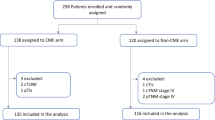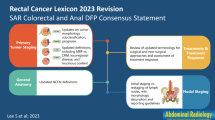Abstract.
Optimized surgical management is the most important factor influencing prognosis of patients suffering for rectal carcinoma. Oncologically radical surgical procedures with the intent of histologically complete resection should be performed, including excision of the tumour in total with sufficient margins in the oral and aboral directions. Total excision of the mesorectal tissue, at least in low-lying rectal tumours, is strongly recommended. Several retro- and prospective studies show that the surgeon him- or herself, using these adequate techniques, is the most important, statistically significant independent prognostic factor in patients with rectal carcinoma. In addition, adjuvant radiochemotherapy, given before or after surgery, decreases the local failure rates of high-risk patients (UICC stages II and III). Such radiochemotherapy is, to the great variety of different local failure rates in different surgical departments mandatory as recommended by the consensus conference of the German Cancer Society in July 1999. New and improved radiation techniques (conformal radiotherapy, intraoperative radiotherapy) could significantly decrease therapy-related toxicity, and innovative schedules (continuous low-dose 5-FU) may show increased therapeutic benefit of adjuvant treatment. Combined radiochemotherapy prior to surgery seems to increase the rate of sphincter-preserving procedures in low-lying rectal cancer. Definitive results and a clear advantage of pre- over postoperative radiochemotherapy (currently being tested in a German multicenter study) are still pending.
Zusammenfassung.
Bei der Prognose der Rectumcarcinome ist die chirurgische Therapie unter Einhaltung der onkologischen Radikalitätsprinzipien von entscheidender Bedeutung. Oberstes Therapieziel sollte die R0-Resektion sein. Neben der Monoblock-Entfernung des tumortragenden Enddarmabschnitts mit dem dazugehörenden Mesorectum werden ausreichende orale, aborale und laterale Sicherheitsabstände verlangt. Der Chirurg hat durch seine adaequate Operationstechnik mit der Senkung der Lokalrezidivrate einen wesentlichen Einfluß auf die Überlebenswahrscheinlichkeit seiner Patienten. Der Prognosefaktor „Chirurg“ stellt damit, wie retrospektive und prospektive Untersuchungen bewiesen, neben dem Tumorstadium die bedeutende, statistisch unabhängige Rolle. Durch die präoperative Radiochemotherapie kann man sich eine Steigerung der Rate an kontinenzerhaltenden Operationen erhoffen. Endgültige Ergebnisse und eindeutige Vorteile gegenüber der postoperativen Therapiemodalität, die derzeit in einer Multizenterstudie geprüft stehen noch aus. Die prä- oder postoperative Radiochemotherapie mit 5-Fluorouracil im Stadium UICC II und III stellt, wie vom Konsensuspapier der Deutschen Krebsgesellschaft vom 1.7.1999 empfohlen, im multimodalen Therapiekonzept für Patienten mit einem erhöhten Risiko an Lokalrezidiven und Fernmetastasen eine unverzichtbare Komponente dar.
Similar content being viewed by others
Author information
Authors and Affiliations
Rights and permissions
About this article
Cite this article
Wannenmacher, M., Herfarth, C. Belegtes zur präoperativen Therapie des Rectumcarcinoms. Chirurg 71, 1440–1446 (2000). https://doi.org/10.1007/s001040051242
Issue Date:
DOI: https://doi.org/10.1007/s001040051242




